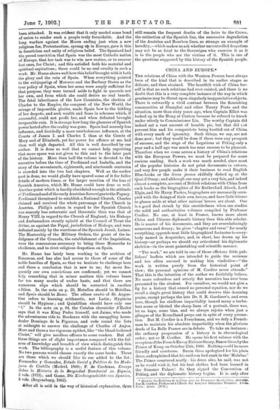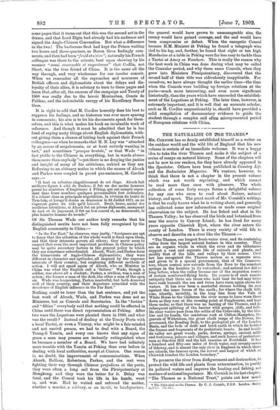CHINA AND EUROPE.*
Ties relations of China with the Western Powers have always been of the kind that is described in its earlier stages as delicate, and then strained. The heartfelt wish of China her- self is that no such relations had ever existed, and there is no doubt that this is a very complete instance of the way in which greatness may be thrust upon singularly inappreciative objects. There is outwardly a vivid contrast between the flourishing communities at Shanghai and other Treaty Ports and the situation, more than sixty years ago, when Captain Elliot was locked up in the Hong at Canton because he refused to knock under utterly to Commissioner Lin. The worthy Captain did indeed eat a vast amount of humble pie, but that did Lot prevent him and his compatriots being hustled out of China with every mark of ignominy. Such things, we say, are not done now ; but they would be done if there were any prospect of success, and the siege of the Legations at Peking only a year and a half ago was much too near success to be pleasant. Therefore when we come across a history of China's relations with the European Powers, we must be prepared for some curious reading. Such a work was much needed, since most of the popular histories do not print documents in extenso, and very few people make it their business to read English Blue-books or the livres jaunes skilfully dished up at the Quai d'Orsay; and although one may get a veil fair, and indeed almost a complete, account of British relations with China from such books as the biographies of Sir Rutherford Alcock, Lord Elgin, and Sir Harry Parkes, biographers are necessarily occu- pied with the doings of their own heroes, and have little leisure to glance aside at what other nations' heroes are about. One is a good deal struck by this onesidedness when one studies the solid and authoritative volumes compiled by Professor Cordier. No one, at least in France, knows more about China and Chinese diplomatic history than this able scholar. He is master of his documents, and they are overwhelmingly numerous and dreary; he gives "chapter and verse" for nearly everything, appends neat little biographical footnotes to every- body named in despatche3, and, in short, has drawn up his history—or perhaps we should say articulated his diplomatic skeleton—in the most painstaking and scientific manner.
" The work," we are told in one of those officious little pub- lishers' leaflets which are intended to guide the reviewer and too often succeed in making him vindictive—" the work is written purely from the historical point of view ; the personal opinions of M. Cordier never obtrude." That this is the intention of the author we faithfully believe. No more colourless and utterly flat narrative has ever been presented to the student. For ourselves, we would not give a fig for a history that owned no personal equation, nor do we recall a single great history that could deserve this damning praise, except perhaps the late Dr. S. R. Gardiner's, and even here, though has studious impartiality tamed many a turbu- lent scene or blotted the sharp lines of a portrait, there was, let us hope, some bias, and we always rejoice when just a glimpse of the Roundhead peeps out in spite of every precau- tion. But M. Cordier is a Frenchman, and we defy a French- man to maintain his absolute impartiality when the glorious deeds of La Belle France are in debate. To take an instance : the ordinary progression of a history is in chronological order ; not so M. Cordier. He opens his first volume with the reception of the French Envoy Extraordinary, Baron Gros,by the Prince of Kung on October 25th, 1860. Nothing could be more friendly and courteous. Baron Gros apologised for his plain dress, andexplained that his uniform had sunk in the 'Malabar.' The Prince countered neatly : his dress also, he said, was not as he would wish it, but his best clothes had been burned in the Summer Palace ! So they signed the Convention of Peking, and the diplomatic history begins. It is only after • Ifistoire des Relations de la Chins arse les Puissance, Occidentales, 18004900. Par 11. Oordier, Prokaseur a 1'Ecolc des Lanzus Orientales Vivantes. 2 yobs.
Paris Alcan. fr.J . _
some pages that it turns out that this was the second act in the drama, and that Lord Elgin had already had his audience and signed the Anglo-Chinese Convention. But what a difference in the two ! The barbarous Scot had kept the Prince waiting two hours and three-quarters, as Baron Gros feelingly com- ments, and then had been "livid et sgvere"; naturally his French colleague was there to the minute, bent upon showing by his manner " aussi convenable et respectueux" that Codlin, not Short, was the true friend of China- It is the same all the way through, and very wholesome for our insular conceit.
When we remember all the reproaches and murmurs of British officers and diplomatists about the delays and dis- loyalty of their allies, it is salutary to turn to these pages and learn that, after all, the success of the campaign and Treaty of 1860 was really due to the heroic Montauban, Comte de Palikao, and the indomitable energy of his Excellency Baron Gros.
It is right to add that M. Cordier honestly does his best to suppress his feelings, and no historian was ever more sparing in comments ; his aim is to let his documents speak for them- selves, and this is what makes his book an invaluable work of reference. And though it must be admitted that he is too fond of saying nasty things about English diplomatists, with- out giving them a chance of hitting back against their French colleagues—as when he remarks that H. N. Lay was " attacked by an access of megalomania, or at least entirely wanting in tact," and sometimes " presgue brutale," or that Wade " in fact yields to the Chinese in everything, but in words abuses them more than anybody "—yet there is no denying the justice and insight of many of his criticisms, unkind as they are.
Referring to an obituary notice in which the names of Alcock and Parkes were coupled in proud pre-eminence, M. Cordier says
"11 faut en rabattre singulierement de cat eloge. Alcock fait mediocre figure h. cote do Parkes; it fut un des morns heureux parmi les ministres d'Angleterre a Peking, qui ont compte cepen- dant dans lours nombres quelques personnalites fort ordinaires. Il a echou6 dans sa principale negotiation, In revision du traits de Tien-tsin, et lorsqu'il donna sa demission le 22 Juillet 1871, on ne s'apercut guare du vide gull laissait. Droit, brave, anima des meilleurs intentions, si Alcock fut un piteux diplomats, manquant de tact et de jugement, it fut un bon consul et, an demeurant, le plus honnete honune du monde."
Of Sir Thomas Wade our author truly remarks that his distinguished merits have not been fully recognised by the English community in China :—
" In the Far East," he observes, very justly, "foreigners are apt to fancy that the attention of the whole world is fixed upon them, and that their interests govern all others; they never seem to suspect that even the most important problems in Chinese policy may be quite secondary factors in the general policy to which they are sometimes subordinated. Alcock, Wade, and Parkes form the triumvirate of Anglo-Chinese diplomatists; they were different in character and aptitudes, all inspired by the supreme interests of their country, but employing different methods of action. I will not speak again of Alcock, who as Minister in China was what the English call a 'failure.' Wade, though a soldier, was above all a student; Parkes, a civilian, was a man of action ; the former a man of the desk, the other a man of the open air. Wade was temporising, Parkes masterful, but both deserved well of their country, and their departure coincided with the decadence of English influence in the Far East."
Nothing could be truer than the last sentence, and yet the best work of Alcoa, Wade, and Parkes was done not as Ministers, but as Consuls and Secretaries. In the "forties" and " fifties " everybody said that nothing could be effected in China until there was direct representation at Peking. After two wars the Legations were planted there in 1860, and what was the result P Instead of dealing at the Treaty Ports with a local Taotai, or even a Viceroy, who might be a fair-minded and not uncivil person, we had to deal with a Board, the Tsung-li Yemen, and every one knows that any signs of grace a man may possess are instantly extinguished when he becomes a member of a Board. We have had infinitely more trouble with the Yemen at Peking than ever before in dealing with local authorities, except at Canton. One reason is, no doubt, the improvement of communications. When Alcock, Balfour, Robertson, Parkes, and the rest were fighting their way through Chinese prejudices at the ports, they were often a long sail from the Plenipotentiary at Hongkong, and they were the better for it. Delay was fatal, and the Consul took his life in his hands, went
.and won. Had he waited and referred the matter, whether a murder, a robbery, or an insult, to headquarters,
the quarrel would have grown to unmanageable size, the enemy would have gained courage, and the end would have been compromise or defeat. When the energetic Consul became H.M. Minister it Peking he found a telegraph wire tied to his leg, and, further, he found that eight or ten high Mandarins at a table in Peking were far less easy to tackle than a Taotai at Amoy or Foochow. This is really the reason why the best work in China was done during what may be called the Consular period, and why these same Consuls, when they grew into Ministers Plenipotentiary, discovered that the second half of their title was ridiculously inapplicable. For ourselves, we have always thought the earlier time—the time when the Consuls were building up foreign relations at the ports—much more interesting, and even more significant historically, than the years which have succeeded the establish- ment of the Legations at Peking. The later time, however, is extremely important, and it is well that an accurate scholar, such as M. Cordier unquestionably is, should have provided a solid compilation of documentary evidence to guide the student through a complex and often misrepresented period of European relations with China,







































 Previous page
Previous page